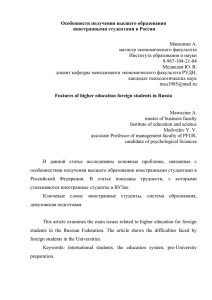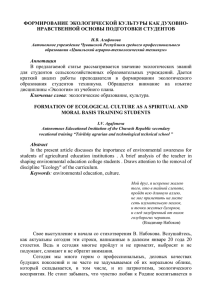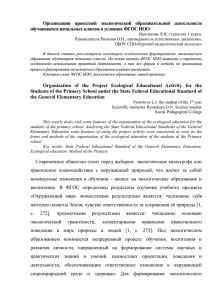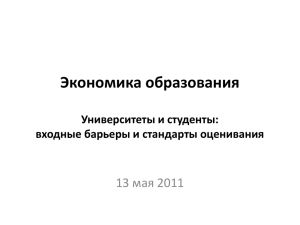КОНТРОЛЬНАЯ РАБОТА № 1 Вариант A
реклама
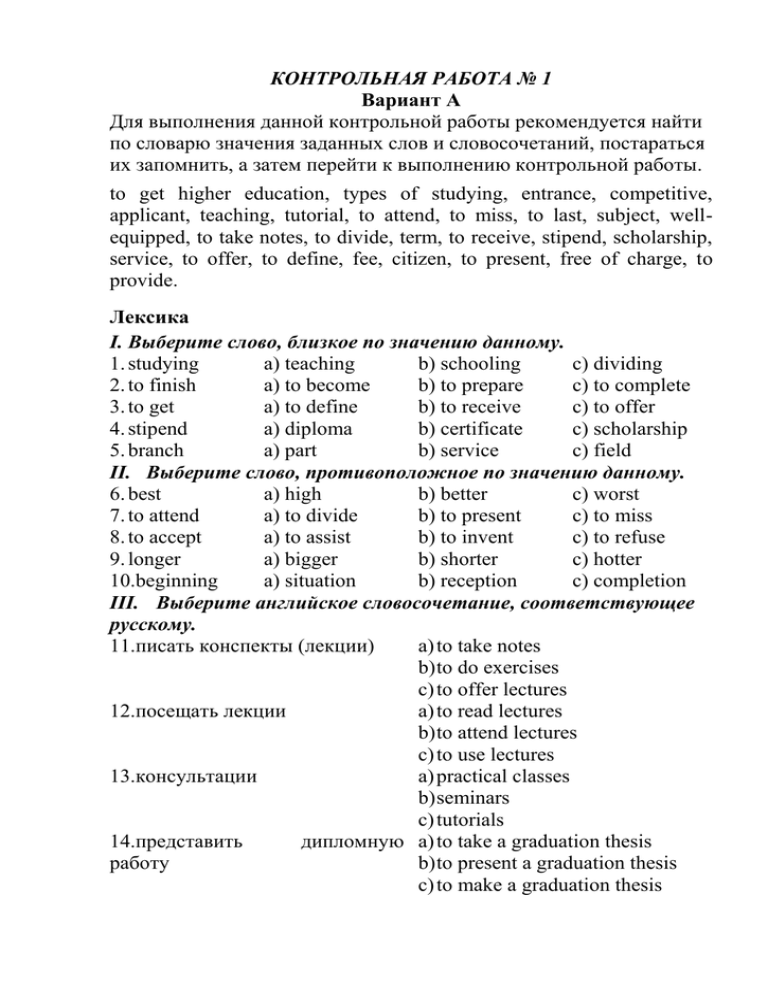
КОНТРОЛЬНАЯ РАБОТА № 1 Вариант A Для выполнения данной контрольной работы рекомендуется найти по словарю значения заданных слов и словосочетаний, постараться их запомнить, а затем перейти к выполнению контрольной работы. to get higher education, types of studying, entrance, competitive, applicant, teaching, tutorial, to attend, to miss, to last, subject, wellequipped, to take notes, to divide, term, to receive, stipend, scholarship, service, to offer, to define, fee, citizen, to present, free of charge, to provide. Лексика I. Выберите слово, близкое по значению данному. 1. studying a) teaching b) schooling c) dividing 2. to finish a) to become b) to prepare c) to complete 3. to get a) to define b) to receive c) to offer 4. stipend a) diploma b) certificate c) scholarship 5. branch a) part b) service c) field II. Выберите слово, противоположное по значению данному. 6. best a) high b) better c) worst 7. to attend a) to divide b) to present c) to miss 8. to accept a) to assist b) to invent c) to refuse 9. longer a) bigger b) shorter c) hotter 10.beginning a) situation b) reception c) completion III. Выберите английское словосочетание, соответствующее русскому. 11.писать конспекты (лекции) a) to take notes b) to do exercises c) to offer lectures 12.посещать лекции a) to read lectures b) to attend lectures c) to use lectures 13.консультации a) practical classes b) seminars c) tutorials 14.представить дипломную a) to take a graduation thesis работу b) to present a graduation thesis c) to make a graduation thesis IV. Найдите слово, выпадающее из данной тематической группы. 15. a) pay b) fee c) degree d) cost 16. a) to join b) to link c) to support d) to connect 17. a) apparatus b) device c) instrument d) set 18. a) college b) institute c) correspondence d) university V. Найдите слово, объединяющее данную тематическую группу. 19. a) applicant b) student c) department d) institute 20. a) chemist b) scientist c) biologist d) ecologist 21. a) subject b) tutor c) education d) college 22. a) good b) mark c) excellent d) satisfactory VI. Из данных слов выберите то, которое закончит предложение. 23. Entrance to the university or the institute is … examinations. a) common b) unusual c) competitive 24. Applicants who … the examinations become the first year students. a) pass b) fail c) take 25. Any citizen in Russia can get secondary or high …. a) schooling b) studying c) education 26. The students … the experimental work in the laboratories and shops of the university. a) train b) attend c) carry out Грамматика Для успешного выполнения заданий по грамматике необходимо проработать следующие темы. глаголы to be, to have и остальные глаголы в Present, Past, Future Simple (Active Voice), оборот there be, степени сравнения прилагательных, словообразование (суффиксы –tion, -er, -or, -ness, -ity, -ian, -ive, ful, -less, -ly, -ic) I. По суффиксу определите, какому из английских слов соответствует предъявленное русское слово. 1. различие a) differ b) different c) difference 2. академик a) academy b) academic c) academician 3. абитуриент, претендент a) applicant b) application c) applicable 4. переписка, корреспонденция a) correspondent b) correspondence c) correspond 5. демократический a) democrat b) democracy c) democratic II. Из данных предложений выберите предложения с прилагательными в сравнительной и превосходной степени и переведите их. 6. Students get higher education at the institutes and universities. 7. The best students receive different types of scholarship. 8. Russia has the most democratic system of education. any citizen can get a secondary or higher education. 9. Most of the students do not pay for their studying. 10. Moscow University is one of the oldest universities in Russia. III. Прочитайте следующие предложения, поставьте глагол “to have” в Past Simple и Future Simple в утвердительной и вопросительной форме. 11. Applicants have entrance examinations in August. 12. The students have 3 lectures on Mondays. 13. This Institute has a correspondence department. 14. The University has its own newspaper which describes the students’ life. 15. The students of a technical college have special subjects. IV. Какое русское предложение соответствует данному английскому и почему. 16. This professor gave very interesting lectures on microcomputers. a) Этот профессор читает интересные лекции по микрокомпьютерам. b) Этот профессор прочитал интересные лекции по микрокомпьютерам. c) Этот профессор прочитает интересные лекции по микрокомпьютерам. 17. Russia provides the students with everything necessary for their studies. a) Россия обеспечила своих студентов всем необходимым для учебы. b) Россия обеспечивает своих студентов всем необходимым для учебы. c) Россия обеспечит своих студентов всем необходимым для учебы. 18. They will have a course of lectures on microelectronics. a) У них был курс лекций по микроэлектронике. b) У них будет курс лекций по микроэлектронике. c) У них есть курс лекций по микроэлектронике. 19. There were many interesting subjects in our first year. a) На первом курсе у нас много интересных предметов. b) На первом курсе у нас было много интересных предметов. c) На первом курсе у нас будет много интересных предметов. Понимание прочитанного Прочитайте текст, вдумайтесь в его содержание, постарайтесь понять его, чтобы выполнить задания после текста. 1. Students get higher education at the institutes and universities. There are more than 850 institutes and universities in Russia with three types of schooling. full-time, art-time or evening at correspondence. 2. Entrance to the University or to the Institute is by competitive examinations which is open to anyone between the age of 17 to 35 who finished a secondary school. 3. In summer beginning from the end of May up to the middle of August the applicants take the entrance examinations in different institutions. Those who passed the exams become the first year students. 4. The complete course of studying lasts 5 years, but in some of them it may be a little longer or shorter. 5. At the institutes and universities teaching takes the form of lectures, classes, seminars and tutorials. The students attend lectures on different subjects and take notes of them. They have practical work in laboratories and shops of the institutes. The laboratories are wellequipped with modern apparatus. There is also a library at each institute where the students can take the necessary literature. 6. The academic year of the university or the institute is divided into 2 terms. The students take examinations at the end of each term or a year. On completion of studies the undergraduate presents a graduation thesis or passes final state examination, receives a specialty and begins to work in different branches of our industry or national economy. 7. Russia has the most democratic system of education. any citizen can get a secondary or higher education. Most of schooling is free of charge and deserved students receive different types of scholarship. Пояснения к тексту. correspondence education (department) – заочное обучение (отделение) competitive – конкурсный to take an examination – держать экзамен to pass an examination – сдать экзамен free of charge – бесплатный laboratories and shops – лаборатории и мастерские a graduation thesis – дипломная работа undergraduate – выпускник I. Какое из данных утверждений выражает основную идею текста? a) Российская система образования является единой общегосударственной системой. b) Система высшего образования в России. c) Система образования в России - самая демократическая система. II. Запишите номер абзаца, в котором вы найдете ответ на вопрос. What do the universities and institutes provide the students with? III. Расположите данные пункты плана в последовательности, соответствующей содержанию текста. 1. Academic year, examinations and presentation of a graduation thesis. 2. Enrolling in the institute. 3. Different forms of teaching. 4. Types of studying. IV. Запишите заголовок к тексту (по-английски). V. Переведите письменно 5, 6, 7 абзацы текста.
